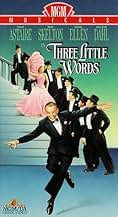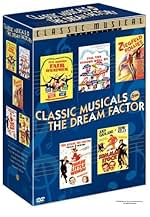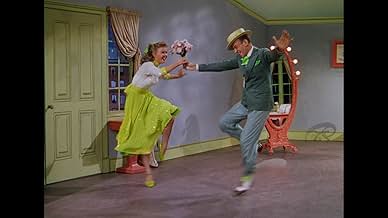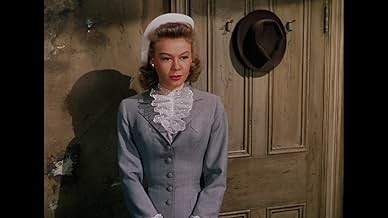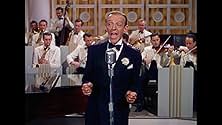NOTE IMDb
6,9/10
2,2 k
MA NOTE
Ajouter une intrigue dans votre langueThe story of the successful Tin Pan Alley songwriting team of Bert Kalmar and Harry Ruby is told loosely and lightheartedly.The story of the successful Tin Pan Alley songwriting team of Bert Kalmar and Harry Ruby is told loosely and lightheartedly.The story of the successful Tin Pan Alley songwriting team of Bert Kalmar and Harry Ruby is told loosely and lightheartedly.
- Réalisation
- Scénario
- Casting principal
- Nommé pour 1 Oscar
- 3 victoires et 3 nominations au total
Gloria DeHaven
- Mrs. Carter De Haven
- (as Gloria De Haven)
Harry Mendoza
- The Great Mendoza
- (as The Great Mendoza)
Jean Adcock
- Woman
- (non crédité)
Richard Allan
- Chorus Boy
- (non crédité)
William Bailey
- Man in Audience
- (non crédité)
Harry Barris
- Pianist at Party
- (non crédité)
Avis à la une
This is my favorite of all Red Skelton's movies; he does a fine job as Ruby and his partnership with Kalmar, played by Fred Astaire who wrote many songs back in the 1920s and 30s. Of course, the music is grand and the dancing of Astaire and Vera-Ellen is most enjoyable. And the beautiful Arlene Dahl is the wife of Red. I thought she was more gorgeous than Rita Hayworth. Of particular note, a cute little blonde got her start in films as the voice of that Betty Boop girl, Helen Kane. She was Debbie Reynolds who sang "I Want to be Loved By You". Lots of the good old songs!
This movie is an excellent representation of the talents of all four stars,Fred Astaire,Vera Ellen,Red Skelton, and Arlene Dahl. Astaire and Vera Ellen open the show with as good a dance routine that I have seen. "Where did you get that girl" is wonderful,bright,and energetic. Red Skelton always one of my favorite funny men is very good and Arlene Dahl is as pretty as any of them. It's a shame that these types of movies aren't made anymore, because they brought joy and happiness to both my wife and I and we watch the dance scenes over and over,especially Where did you get that girl. Vera Ellen was certainly as good as any of Astaires partners and in my opinion the best of all of them.
Although Astaire was a bit past his prime in the dancing area, this is by far the best acting performance he gave (Towering Inferno Oscar nod included). His Bert Kalmar is complex, restless, at times testy, and very much a real person compared to the standard Astaire character. Whether the circumstances depicted in the movie were fact or fiction, he is really a character with a distinct persona, as opposed to Fred Astaire essentially playing himself as in most other his other films.
This is what MGM did best. Musicals. Ah, they were all so wonderful, and THREE LITTLE WORDS in one of them. A nice, quiet muscial with great songs and dance numbers. Don't know how much of this is real biographical, but it's well done and interesting. Nice work from Astaire and Skelton as Kilmer and Ruby. The leading ladies are quite wonderful with Arlene Dahl at her dreamiest, though she doesn't have much to work with here. Because of story implications, Astaire doesn't dance after the first half, but until then he's sensational as always with Vera Ellen doing some fine hoofing as well. This was Debbie Reynolds 3rd film, having a bit in JUNE BRIDE and a small roll in DAUGHTER OF ROSIE O'GRADY. No Decalogue here and her voice is dubbed, but she makes an impression. For a nice, cozy evening, cuddle up with this DVD version of THREE LITTLE WORDS.
... because the whole thing goes down so easy.
It's an odd combination - Red Skelton and Fred Astaire. It was the only time that they ever played opposite one another. They were both in a couple of the big MGM ensemble musicals of the era - "Ziegfeld Follies" comes to mind - but they didn't do anything together in them. That's too bad, because their styles seem to bring out the best in each other as far as acting goes. Fred becomes more of a comic. Red becomes subdued.
This is the very fictionalized biopic of songwriting team Bert Kalmar (Fred Astaire) and Harry Ruby (Red Skelton). In the film, Kalmar is a dancer who is a part time playwright and magician. One night when Kalmar is performing his magic act, Ruby, a stagehand, manages to accidentally destroy everything single-handedly, causing Kalmar to get laughed off the stage. This is the "meet cute" phase. When Kalmar injures his knee and must lay off dancing for two years, he becomes a full-time songwriter and ends up reluctantly partnered with Ruby, who he still blames for ruining his act that one time. Of course, reluctance turns to friendship and great success. There are squabbles along the way and Kalmar and his wife (Vera Ellen of the tiny waistline) step in to discretely disrupt Ruby's bad romantic choices.
The squabbles are short lived and on the surface, for there really are no villains in this film, not even a buffoonish one like Singin' In the Rain's Lena Lamont. It's just the great balance of comedy, music, and heart that many of MGM's other musicals wanted to be but just could not quite accomplish. This one has aged very well, and I'd recommend it.
It's an odd combination - Red Skelton and Fred Astaire. It was the only time that they ever played opposite one another. They were both in a couple of the big MGM ensemble musicals of the era - "Ziegfeld Follies" comes to mind - but they didn't do anything together in them. That's too bad, because their styles seem to bring out the best in each other as far as acting goes. Fred becomes more of a comic. Red becomes subdued.
This is the very fictionalized biopic of songwriting team Bert Kalmar (Fred Astaire) and Harry Ruby (Red Skelton). In the film, Kalmar is a dancer who is a part time playwright and magician. One night when Kalmar is performing his magic act, Ruby, a stagehand, manages to accidentally destroy everything single-handedly, causing Kalmar to get laughed off the stage. This is the "meet cute" phase. When Kalmar injures his knee and must lay off dancing for two years, he becomes a full-time songwriter and ends up reluctantly partnered with Ruby, who he still blames for ruining his act that one time. Of course, reluctance turns to friendship and great success. There are squabbles along the way and Kalmar and his wife (Vera Ellen of the tiny waistline) step in to discretely disrupt Ruby's bad romantic choices.
The squabbles are short lived and on the surface, for there really are no villains in this film, not even a buffoonish one like Singin' In the Rain's Lena Lamont. It's just the great balance of comedy, music, and heart that many of MGM's other musicals wanted to be but just could not quite accomplish. This one has aged very well, and I'd recommend it.
Le saviez-vous
- AnecdotesBert Kalmar and Harry Ruby were friends of Fred Astaire from their early days together in vaudeville. Astaire said the film was one of his all-time favorites.
- GaffesThe stills of the The Marx Brothers (three rather than four) outside the opening of Animal Crackers (Broadway, 1928) is actually from Les Marx au grand magasin (1941).
- Citations
Bert Kalmar: I wouldn't write that song with you if you begged me.
Harry Ruby: Begged ya? I didn't even ask ya.
Bert Kalmar: I guess you just can't help it, Harry. I feel sorry for you.
Harry Ruby: Feel sorry for me? You must think I'm just a...
Bert Kalmar: I could tell you what I think of you in just three little words. You're a dope!
- Crédits fousThe opening and end titles use various first pages of Kalmar-Ruby sheet music as backgrounds.
- ConnexionsFeatured in Metro-Goldwyn-Mayer's World Famous Musical Hits! (1962)
- Bandes originalesWhere Did You Get That Girl?
(uncredited)
Written Harry Puck, Bert Kalmar
Sung and Danced by Fred Astaire, Vera-Ellen (dubbed by Anita Ellis)
Meilleurs choix
Connectez-vous pour évaluer et suivre la liste de favoris afin de recevoir des recommandations personnalisées
- How long is Three Little Words?Alimenté par Alexa
Détails
Box-office
- Budget
- 1 470 000 $US (estimé)
- Durée1 heure 42 minutes
- Couleur
- Rapport de forme
- 1.37 : 1
Contribuer à cette page
Suggérer une modification ou ajouter du contenu manquant

Lacune principale
By what name was Trois petits mots (1950) officially released in India in English?
Répondre



